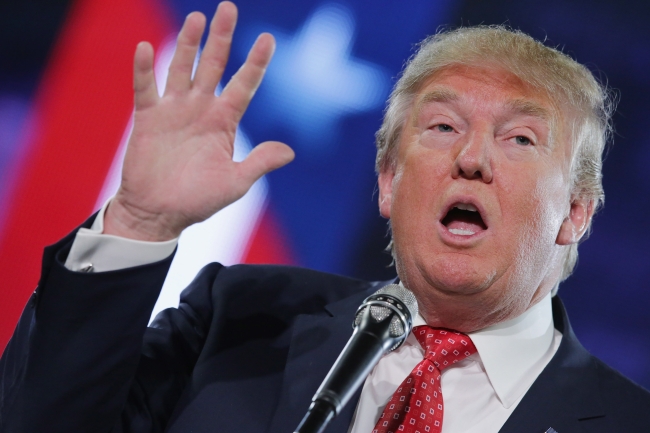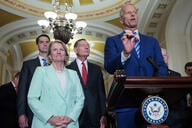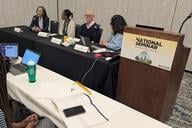You have /5 articles left.
Sign up for a free account or log in.

Getty Images
Trump University has become prominent in the presidential campaign as Donald Trump’s Republican rivals seize on legal troubles facing his now-defunct for-profit school.
A conservative group that opposes Trump now is running advertisements featuring former students who say they were defrauded by the school. And the issue may get more attention as a class-action lawsuit against the school moves toward a trial, at which Trump himself may have to testify.
The allegation that the billionaire businessman and former reality TV star hoodwinked students who attended sessions at his school, which cost up to $35,000, is great fodder for Trump’s opponents in the presidential primary campaign -- one that already has been focused far more on student loan debt than previous cycles.
But the case of Trump University also highlights the role states play in regulating educational providers at a time when many are calling for greater consumer protections for students.
Trump University, which Trump in 2013 compared to the University of Pennsylvania's Wharton School and Harvard University, was not an actual university but rather consisted of seminars promising lessons in real-estate investing.
The for-profit enterprise did not award degrees, was not accredited and didn’t receive federal funding, putting it outside the reach of regulators at the U.S. Department of Education, which has cracked down on some for-profit education providers under the Obama administration.
Amid concerns that some states were lax in their oversight of colleges, especially for-profit institutions, the White House in recent years has also tried to prod states into beefing up state regulation of colleges that seek to be eligible for federal loans or grants.
But when it comes to education providers that don’t receive federal money, the regulatory power falls to the states and their education and consumer protection laws, which can vary significantly.
Stephanie Riegg Cellini, an associate professor of public policy and economics at George Washington University, has studied for-profit education providers that receive federal subsidies as well as those that don’t.
“These non-Title IV schools can and do fly under the radar,” she said, referring to institutions that don’t receive federal student aid funding. “It’s all up to states and how much a state wants to regulate them. It can vary tremendously.”
Cellini and Claudia Goldin of Harvard University have estimated, based on a sample of five states, that about 670,000 students attend for-profit educational institutions that do not receive federal money and therefore aren’t subject to scrutiny from the Education Department.
Providers that want to issue degrees -- regardless of whether they are accredited -- must seek regulatory approval under the laws of all 50 states. But experts said non-degree-granting institutions like Trump University can sometimes fall into murkier territory.
Trump’s operation, for instance, appears to have been less of a traditional school or job training program than an opportunity to hear and seek advice from purported experts in real-estate investing and business.
States often decide to regulate an entity as an educational provider based on whether or not it is training students for skills needed for a job or enrollment at another institution, according to Alan Contreras, the former head of Oregon’s Office of Degree Authorization.
For example, he said, most states wouldn’t regulate someone charging for lessons on bird-watching as being an educational provider. “But if you’re charging someone money and saying that you are preparing them for the workforce, that’s different.”
The issue of defining educational offerings under state laws has come up with the recent slew of companies that offer in-person -- and sometimes online -- classes on computer coding and other technology-related skills. California regulators in 2014 sent letters warning such coding academies -- which also are non-degree-granting institutions -- that they needed to apply for state recognition or else could not operate there.
In the case of Trump’s operation, a New York state judge ruled in 2014 that the company had operated illegally by not meeting state licensing requirements for education providers. The ruling was part of an ongoing lawsuit brought by New York Attorney General Eric Schneiderman, which also alleges that the company made false and deceptive claims to students.
Trump had earlier, in 2010, changed the name of his school to the Trump Entrepreneur Initiative, at the insistence of New York education regulators, who said it was misleading and illegal for the company to call itself a university.
The case of Trump University “feels more like a consumer protection issue than an education issue,” said George Gollin, a professor of physics at the University of Illinois at Urbana-Champaign, who is an expert on diploma and degree mills. “It really falls more along the line of: Is this a business offering a product and then misrepresenting the validity or the quality of the product?”
That question will be answered in the remaining parts of the New York attorney general’s lawsuit as well as two class-action lawsuits against the school that remain pending in two states.
Trump, for his part, has dismissed the significance of those pending legal cases, claiming that Schneiderman’s lawsuit against him was politically motivated and accusing the judge in that case of being biased because he is Hispanic.




